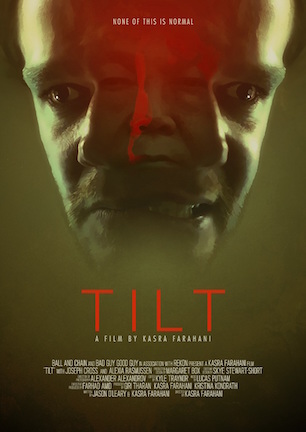Studio: The Orchard
Director: Kasra Farahani
Writer: Jason O’Leary, Kasra Farahani
Producer: Giri Tharan, Kristina Kondrath, Kasra Farahani
Stars: Joseph Cross, Alexia Rasmussen, Jessy Hodges, Kelvin Yu, C.S. Lee
Review Score:
Summary:
An average man’s mind gradually unravels as the pressures of his personal and professional lives consume him with dark thoughts.
Review:
“Tilt” is not the kind of thriller built from kinetic energy that throttles you at the collar with visceral suspense. “Tilt” shakes you psychologically. It ties a knot of haunting tension in your gut and holds it tightly in place through an inescapable sense of disturbing dread dripping from every moment.
The movie’s feel might be likened to “Sun Choke” (review here), “They Look Like People” (review here), even “Nightcrawler” by way of Joe Swanberg or another mumblecore auteur. Hypnotic hooks hit their targets straight out of the gate. First glances present an opening credits montage as seemingly low-key shots of L.A. landmarks and businesses. Except “Tilt” isn’t establishing a location. It’s establishing atmosphere. These specific buildings, these particular park vistas, set subtle impressions that shape the tainted feeling of this environment, not just its geography.
Outward appearances also initially sell downtrodden documentarian Joseph Burns as the nice, normal Everyman next door. But not in the way neighbors commonly claim when a killer is identified after the fact. Joe isn’t hiding a dark alter ego. He is being pushed to create one.
A Hawaiian getaway with his pregnant wife Joanne didn’t give Joe the mental reset he’d hoped for. Coming home to a cramped house, one car, and a landline because he cut his cellphone to save cash, Joe returns to a well-worn rut.
Clinging to a pinch of predominantly imaginary success for a pinball documentary from four years back, Joe’s current passion project is an abstract video essay on American capitalism. He can’t quite crack it creatively however, and Joe’s doubting support structure can no longer coddle his pipe dream.
The impending baby is the breaking point pressuring Joe into an adulthood of stable income and dinner conversation that isn’t condescending. Joanne’s friends politely ask what Joe is working on and immediately retune disinterested ears to clanking forks when he drones on about a cultural disruption his unmarketable movie might spark. It’s a sad moment relatable for anyone who has ever held too long to a “what if?” ideal that simply doesn’t mesh with real world obligations.
“Tilt” examines what happens when a life stuck in idle manifests as darkness instead of as depression. Uncomfortable urges of your own aren’t required to recognize where Joe is coming from or how he got there. This is the result of sleepwalking through a marginalized life without pausing to consider how disengaged thoughts conjure whims that cause careless actions. “Tilt” deconstructs the sociopath archetype and captures his creation at the outset of his disease, making Joe frighteningly reflective of the human condition’s worst capabilities.
Joe isn’t Jeffrey Dahmer. Not yet anyway. He is the stranger who gives you a bad vibe when you’re alone in a parking garage. He is the person standing next to you whose eyes say, “stay away” for reasons you can’t explain. That guy who took a picture of you and a friend in a restaurant that one time? What if the hand that held your phone once strangled a neck, or put a knife in someone’s stomach?
You know Joe. If you don’t, you’ve encountered him before. Any seemingly ordinary person could be one more disappointment, setback, or daily disturbance away from becoming him, and that is what makes Joe’s descent terrifying. Sheep’s clothing has replaced his skin, making his evolving evil impossible to outwardly identify.
Often unnoticed, yet deliberate details tell their own tales in “Tilt.” The film doesn’t force anyone to look at Joanne’s wedding ring with a conspicuous closeup. But those who happen to spot it can see it is a simple gold band. The absence of a diamond tells a story about Joe and Joanne settling for what is achievable while putting on a pretense of something else.
The sadness to “Tilt’s” personality portrait may alienate some while others may not see the mirror Joe holds up to our personal abysses. Love, luck, and prosperity steer normal minds from weighing such considerations, although seeing one’s own potential for extremes is not the only way to connect to “Tilt.”
“Tilt” tells a story, but it is more about mood created through character behavior. Deceptively simple cinematics then maintain that mood in a sideways skew. Scenes seem innocuous. There isn’t much outward action. But a sickly green hue, silent stares, creeping zooms, and unsettling music infuse insidious undertones into every inch of the screen. Through its performances, direction, and cinematography, “Tilt” creates a texture that crawls under your skin and commands you to be spellbound by its eeriness.
Review Score: 85






In hindsight, maybe the more muted “28 Years Later” had to walk so the more meaningful “The Bone Temple” could run.